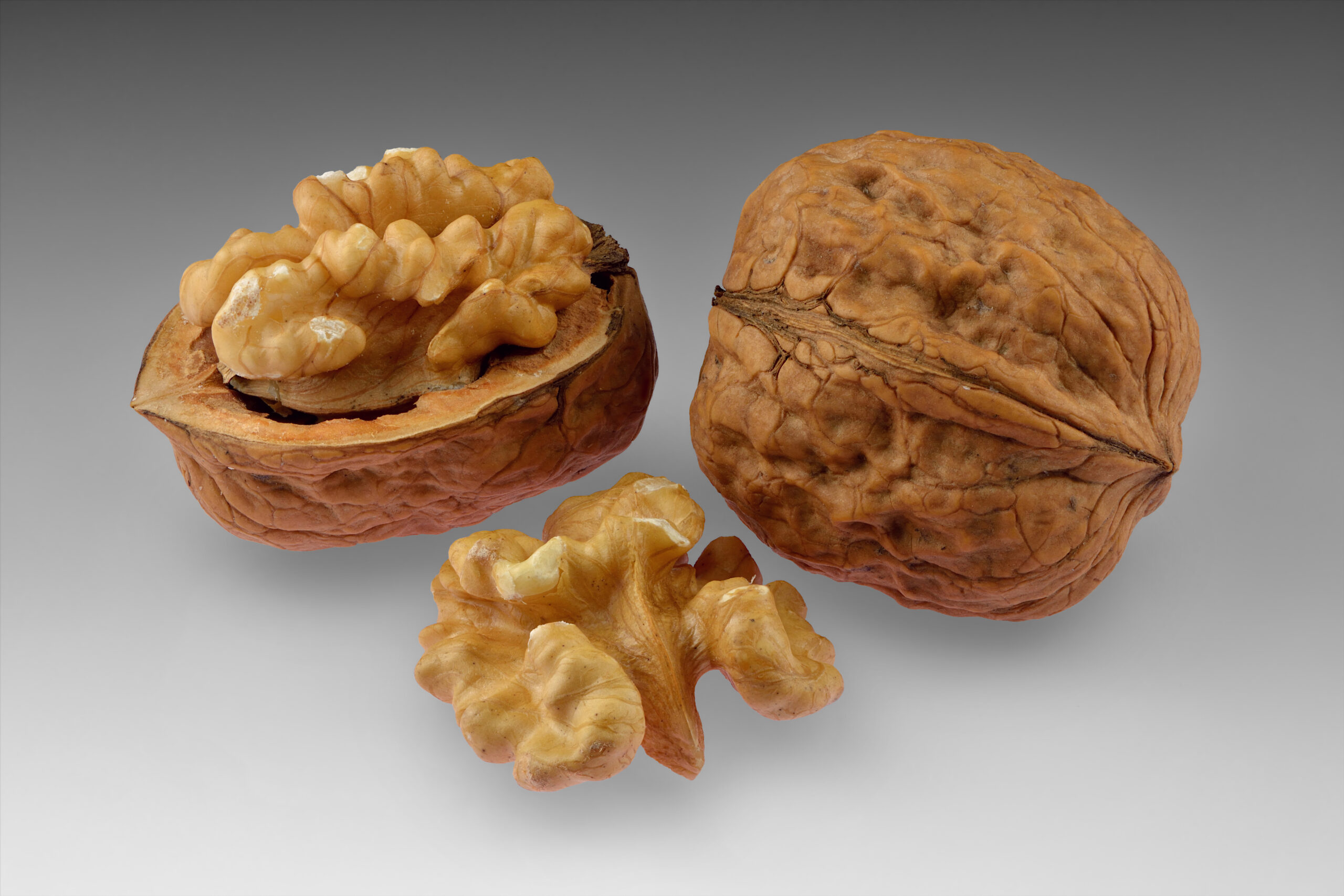Health Benefits of Walnuts
What are the health benefits of walnuts?
Walnuts are nutrient-dense nuts that offer a wide range of health benefits due to their unique nutritional composition. Here are some of the key health benefits of walnuts:
- Heart Health:
- Walnuts are rich in omega-3 fatty acids, particularly alpha-linolenic acid (ALA), which has been linked to improved cardiovascular health. Omega-3 fatty acids help reduce inflammation, lower blood pressure, and decrease levels of LDL (bad) cholesterol, reducing the risk of heart disease.
- Brain Health:
- The omega-3 fatty acids in walnuts, along with antioxidants and polyphenols, may support brain health and cognitive function. Consuming walnuts regularly has been associated with improved memory, learning, and mood.
- Antioxidant Properties:
- Walnuts are rich in antioxidants, including vitamin E, polyphenols, and melatonin, which help neutralize harmful free radicals in the body and reduce oxidative stress. Antioxidants play a crucial role in protecting cells from damage and reducing the risk of chronic diseases.
- Anti-Inflammatory Effects:
- The omega-3 fatty acids and polyphenols in walnuts have anti-inflammatory properties, helping reduce inflammation in the body and lower the risk of chronic inflammatory conditions such as heart disease, arthritis, and certain cancers.
- Weight Management:
- Despite being calorie-dense, walnuts can be beneficial for weight management when consumed in moderation. Their combination of protein, fiber, and healthy fats helps increase satiety and reduce appetite, potentially leading to better weight control.
- Blood Sugar Control:
- Walnuts have a low glycemic index and contain nutrients like fiber, protein, and healthy fats, which can help stabilize blood sugar levels and improve insulin sensitivity. Including walnuts in the diet may be beneficial for individuals with diabetes or at risk of developing diabetes.
- Bone Health:
- Walnuts are a good source of minerals like calcium, magnesium, and phosphorus, which are essential for maintaining strong and healthy bones. Incorporating walnuts into the diet may help reduce the risk of osteoporosis and improve bone density.
- Gut Health:
- Walnuts contain prebiotic fibers, such as soluble and insoluble fibers, that promote the growth of beneficial gut bacteria. A healthy gut microbiota is associated with improved digestion, immune function, and overall health.
- Cancer Prevention:
- Some studies suggest that the antioxidants and anti-inflammatory compounds in walnuts may help reduce the risk of certain types of cancer, including breast cancer, prostate cancer, and colorectal cancer. However, more research is needed to confirm these potential benefits.
- Skin Health:
- The vitamin E and polyphenols in walnuts may help protect the skin from oxidative damage caused by sun exposure and environmental toxins, contributing to healthier skin and a reduced risk of premature aging.
Incorporating a handful of walnuts into your daily diet as part of a balanced and varied eating pattern can provide a wide range of health benefits and contribute to overall well-being.
What are the health risks of walnuts?
While walnuts offer numerous health benefits when consumed in moderation, there are some potential health risks associated with their consumption, particularly for certain individuals. It’s essential to be aware of these risks and to consume walnuts as part of a balanced diet. Here are some potential health risks of walnuts:
- Allergic Reactions:
- Walnuts are a common allergen, and some people may experience allergic reactions upon consuming them. Symptoms of walnut allergy can range from mild itching or swelling in the mouth to more severe reactions such as hives, difficulty breathing, or anaphylaxis. Individuals with known walnut allergies should avoid walnuts and products containing walnuts.
- Digestive Issues:
- Some individuals may experience digestive issues such as bloating, gas, or diarrhea after consuming walnuts, particularly if they have a sensitivity to certain components in nuts or if they consume large quantities at once. Moderation is key, and individuals with digestive issues should monitor their intake of walnuts and other high-fiber foods.
- High Caloric Density:
- Walnuts are calorie-dense due to their high fat content, and consuming them in large quantities without considering portion size can contribute to excess calorie intake, leading to weight gain or obesity. Individuals trying to manage their weight should be mindful of portion sizes when consuming walnuts.
- Omega-6 to Omega-3 Imbalance:
- While walnuts are a good source of omega-3 fatty acids, they also contain omega-6 fatty acids. Consuming too many omega-6 fatty acids relative to omega-3s can contribute to inflammation and may increase the risk of certain chronic diseases if not balanced with sufficient omega-3 intake from other sources.
- Interactions with Medications:
- Walnuts contain compounds that may interact with certain medications, particularly blood thinners like warfarin (Coumadin). Consuming large amounts of walnuts while taking blood thinners may increase the risk of bleeding. Individuals taking medications should consult with their healthcare provider before significantly increasing their walnut intake.
- Aflatoxin Contamination:
- Aflatoxins are toxic compounds produced by certain molds that can contaminate nuts, including walnuts, during storage under warm and humid conditions. Chronic exposure to aflatoxins has been linked to an increased risk of liver cancer. To minimize the risk of aflatoxin exposure, it’s essential to store walnuts properly in a cool, dry place and to purchase them from reputable sources.
- Tooth Damage:
- Walnuts are hard and crunchy, and consuming them in large quantities or biting down on whole walnuts with force may increase the risk of tooth damage, such as cracks, chips, or dental fractures. Individuals with sensitive teeth or dental issues should be cautious when consuming walnuts and may consider opting for chopped or ground walnuts instead.
Overall, walnuts can be a nutritious and healthful addition to a balanced diet when consumed in moderation and as part of an overall healthy lifestyle. However, individuals with allergies, digestive issues, or specific health concerns should exercise caution and consult with a healthcare provider or registered dietitian if unsure about incorporating walnuts into their diet.




